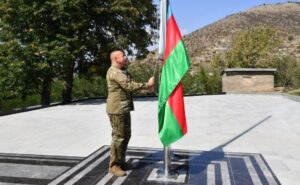
After Azerbaijan established control over the former Nagorno-Karabakh, the Transcaucasus region entered a new era, where the political and economic prospects of the countries of the region became a subject of discussion in the international arena. In light of this, experts from various countries are analyzing the current situation and trying to predict the future of relations between the countries in the region. A new video published on the YouTube channel “Experts club” was devoted to this very topic, in which Azerbaijani military analyst, leading expert of the analytical center “STEM” Agil Rustamzadeh and the founder of the Kiev analytical center “Experts club”, candidate of economic sciences Maxim Urakin shared their opinion on the situation.
Military-political aspect
The experts emphasize the importance of the reached mutual understanding on the Karabakh issue.
“The resolution of the conflict has created a basis for the resumption of diplomatic dialog and economic cooperation between the countries of the Transcaucasus. Azerbaijan’s confrontation with Armenia is conditioned not only by the Karabakh conflict, the point is that those people who created this geopolitical paradigm were engaged in shaping the worldview of the Armenian population. A part of the Armenian population still believes that they once had a state that included the territories of Azerbaijan, Turkey and Georgia. With the emergence of Western institutions and the change of Armenians’ views, they begin to realize that enmity with such a geopolitical player as Turkey is a dead-end way of the country’s development. It is a way to nowhere, especially when these countries have no territorial claims to you, but you have territorial claims to your neighbors,” Rustamzadeh stressed.
The expert also notes that the signing of a possible peace treaty will give Armenia an impetus to move to a new level of development, will allow it to become not an object but a subject of international politics.
“I meet such an opinion both in Azerbaijan and Turkish colleagues. It is that under certain changes Turkey and Azerbaijan can become the guarantor of Armenia’s territorial integrity. Therefore, I believe that with the pragmatism shown by the Armenian people, the government and the political elite of Armenia, Armenia has chances to become a pro-Western democratic country,” Rustamzadeh said.
In his opinion, in order to ensure long-term stability, it is necessary to analyze all aspects of the conflict and its consequences for regional security.
Economic aspect
Maxim Urakin emphasized the economic sphere of relations between the countries of the region.
“Economy and politics are closely linked, and trade relations between the countries of the Transcaucasus play an important role in shaping the political landscape of the region,” Urakin noted.
The expert also drew attention to how export destinations affect the countries’ political preferences.
“Most of Azerbaijan and Iran’s exports are directed to Europe and Asia, while Turkey’s exports are much more diversified,” the economist emphasized.
Urakin also analyzed each country’s exports and their trade relations in detail, emphasizing the interconnectedness of economic and political factors in the region.
Development Prospects
Rustamzadeh and Urakin agree that further sustainable development of the region requires further work to resolve the remaining conflict situations and increase economic cooperation between the countries.
“Restoring trust and strengthening economic ties between the countries of the Transcaucasus will contribute to the creation of a favorable climate for investment and growth of the regional economy,” Rustamzadeh concluded.
You can learn more about the prospects of development of the Transcaucasus after the end of the Karabakh conflict from the video on the Experts club channel at the link:
Subscribe to the channel here:
ARMENIA, AZERBAIJAN, CAUCASUS, KARABAKH, NAGORNY_KARABAKH, RUSTAMZADEH, URAKIN, WAR

Armenia and Turkey have agreed to accelerate the process of dialogue to finally open the border between the countries, Armenian Foreign Minister Ararat Mirzoyan said.
“Concrete agreements have been reached. There is a decision to speed up the process of dialogue to finally open the border between Armenia and Turkey,” Mirzoyan said at a government meeting on Thursday, presenting the results of his February 15 visit to Turkey.
According to him, an agreement has also been reached to open the Armenian-Turkish border for citizens of third countries and holders of Armenian and Turkish diplomatic passports before the start of the tourist season.
The minister also said that Armenian rescuers sent to Turkey will return home through the land border on Thursday.
For his part, Armenian Prime Minister Nikol Pashinyan said the republic’s actions to help Turkey are exclusively humanitarian in nature.
“It is absolutely unacceptable to criticize us, because I cannot imagine a situation where millions of people in a neighboring country need help and someone can be indifferent. This is unacceptable,” Pashinyan said.
On the other hand, he said, Armenia emphasizes the need to change the quality of relations in the region.
“I regret that a certain change is taking place in the face of such a tragedy. But perhaps human tragedies make people more understandable to each other. This is an objective reality. I hope it can become a new starting point for establishing relations between Armenia and Turkey,” Pashinyan said.
He also said that the preliminary design of the reconstruction of Ani bridge on the border between Armenia and Turkey is ready.

The new Ukrainian airline Bees Airline in April-June launches regular direct flights from Kyiv to Tbilisi, Batumi and Yerevan, as well as from Odesa to Yerevan.
According to the press service of Kyiv Sikorsky International Airport, in particular, Kyiv-Tbilisi-Kyiv flights will be launched from April 30 and will be operated on Tuesdays and Fridays, and from June 6 additionally on Sundays.
Kyiv-Batumi-Kyiv flights will be operated from June 9 on Mondays, Wednesdays, Fridays and Sundays.
Kyiv-Yerevan-Kyiv flights will be launched from April 29 on Mondays and Thursdays.
Odesa-Yerevan-Odesa flights will start from June 14 on Mondays and Fridays.
In addition to Bees Airline, UIA and SkyUp also operate direct flights from Kyiv to Tbilisi, and SkyUp to Batumi. UIA also operates direct flights from Kyiv to Yerevan.
As reported, the State Aviation Administration of Ukraine issued an operator certificate to Bees Airline on March 12, 2021. Later, the regulator allowed the company to operate flights on 31 routes – 15 regular and 16 charter.

The Ukrainian airline SkyUp has launched flights from Kyiv to Yerevan, Varna and Burgas, according to the company’s website. According to its data, the flights will be operated with departure from Boryspil airport (Kyiv, Terminal F).
Flights on the route Kyiv-Yerevan from May 17, 2019 will be operated twice a week on Mondays and Fridays.
Kyiv-Varna flights from June 14, 2019 will be operated on Fridays, flights on the Kyiv-Burgas route from May 31 with a frequency of two or three times a week.
As reported, in 2018 SkyUp Airlines passenger traffic amounted to 442,000 people.
As of January 2019, SkyUp’s fleet included five aircraft: four Boeing 737-800 NG aircraft with 189 seats, and one Boeing 737-700 NG airplane with 149 seats.